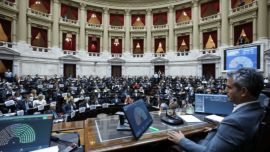Pope Francis believes that Latin America is still "a victim of exploitative imperialisms" and has urged the region to work together and fulfill the dream of independence heroes José de San Martín and Simón Bolívar in an extensive interview with the state news agency Télam released on Friday.
"Latin America is still on that slow path of struggle, the path of San Martín and Bolívar’s dream of unity for the region," the Argentine pontiff said in the interview granted to Bernarda Llorente at his residence in the Vatican.
The region "has always been a victim and it will be a victim until it completes its liberation from exploitative imperialisms," Francis stressed, declining to name them.
"I don’t want to mention any in particular because it is so obvious that everyone can see them," he added.
Asked about the political changes that have taken place in several Latin American countries, with popular and inclusive projects that reject neoliberalism, the Argentine pope recalled that "San Martín and Bolívar’s dream was a prophecy."
"This is the challenge to achieve unity in Latin America. Each people must feel one with its identity and, at the same time, in need of the other’s identity. It is not easy," he added.
Francis, 85 and the first Latin American pope in history, will next year celebrate 10 years as pontiff. During the interview, he took stock of his work, spoke of the war in Ukraine, the impact of the coronavirus pandemic, young people and agreed that he feels he has left an "imprint" on the church in Latin America.
"The Latin American Church has a long history of being close to the people," he said.
"If we go over the episcopal conferences – the first one at Medellín, then Puebla, Santo Domingo and Aparecida – they were always in dialogue with the people of God. And that really helped. It is a popular Church, in the real sense of the word," he explained.
On the subject of his health, and in response to the question "Does Pope Francis have a long way ahead?" he replied: "That's up to Him to decide."
– TIMES/AFP






















Comments